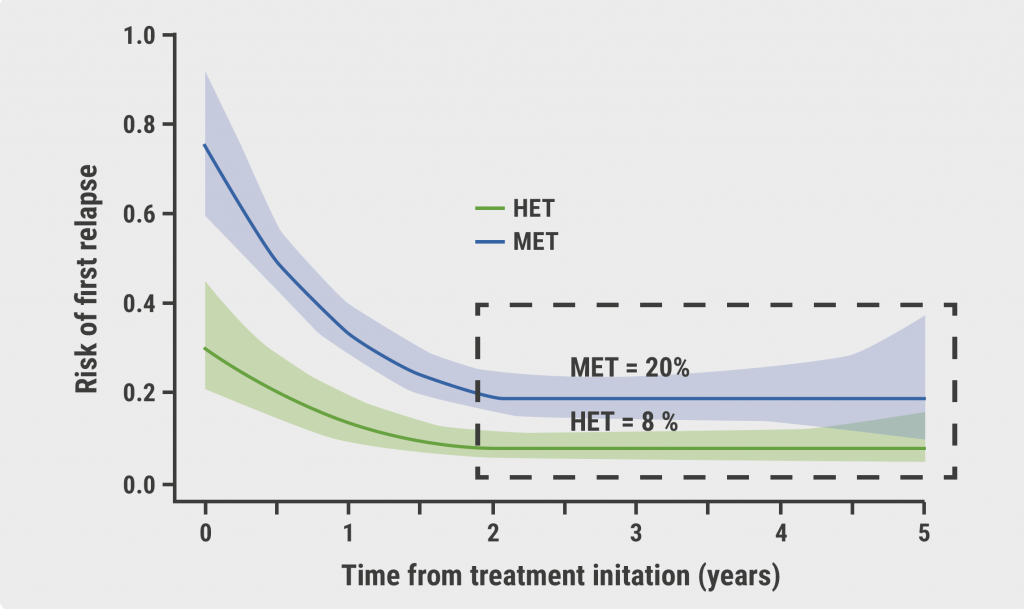Neuropsychiatric changes, including personality disturbances, are common in patients with MS. Personality traits may help explain differences on an individual level in disease acceptance, coping styles, and psychological well-being. As such, these traits impact patient care, compliance, and quality of life, and they influence healthy behaviour, symptoms, and comorbidities. Little is known about the personality of MS patients at the earliest stages of the disease.
To this end, the MS clinic of the Western University in Canada performed a retrospective chart review on adult patients that had been recently diagnosed with MS. Comprehensive baseline psychometric testing of MS patients, including NEO-Five Factor Inventory (NEO-FFI), is a standard of care in this centre. The study aimed to determine if an “MS personality” exists and which personality traits would then predominate. Dr Laura Chu (Memorial University of Newfoundland, Canada) shared the results.
The study included NEO-FFI results of 390 patients, collected within the first 2 years after the diagnosis. Of these, 363 (93%) patients had relapsing-remitting MS, about two thirds were female, and nearly all were white. The mean age was 38 years and median Expanded Disability Status Scale (EDSS) score was 2.0 (0.0–6.0). The most frequently prescribed treatments were interferon beta/glatiramer acetate (32.8%), dimethyl fumarate (15.9%), or teriflunomide (7.4%); a large proportion (39.0%) received no treatment at all.
Overall, the personality trait most predominantly present was being (highly) agreeable: 53.9% of participants were rated “high” or “very high”, and 29.0% “average.” A slight tendency towards higher rates of conscientiousness, openness, and neuroticism was detected. Being extravert was generally less prominent: 38.0% scored “low” or “very low”, while 27.2% scored “high” or “very high”. On average, women had significantly higher degrees of agreeableness (P<0.001) and conscientiousness (P=0.007). No significant differences between women and men for neuroticism, extraversion, or openness were detected.
- Chu L. Is there a multiple sclerosis (MS) personality? Personality characteristics in persons with recently diagnosed MS at a single Canadian centre. P078, ECTRIMS 2021 Virtual Congress, 13–15 October.
Copyright ©2021 Medicom Medical Publishers
Posted on
Previous Article
« Charcot Award 2021: Progressive MS, a personal perspective Next Article
“Expanded Disability Status Scale 0 is not normal” »
« Charcot Award 2021: Progressive MS, a personal perspective Next Article
“Expanded Disability Status Scale 0 is not normal” »
Table of Contents: ECTRIMS 2021
Featured articles
Preliminary data shows positive results of ATA188 for progressive MS
COVID-19
MS patients at risk of hampered immune response after vaccination
Immunotherapy in MS does not influence COVID-19 severity and mortality
Anti-CD20 antibodies associated with worse COVID-19 outcomes
ECTRIMS-EAN consensus on vaccination in MS patients
Experimental Treatments
The role of astrocyte phenotypes in acute MS lesions
Promising results of intrathecal MSC-NTF cells in progressive MS
Preliminary data shows positive results of ATA188 for progressive MS
Evobrutinib reduces relapses and MRI lesion activity
Primary endpoint of opicinumab for relapsing MS not met in AFFINITY trial
Elezanumab did not outperform placebo in progressive and relapsing MS
Ibudilast reduced retinal atrophy in primary progressive MS
Treatment Trials and Strategies
ECTRIMS/EAN Clinical Guidelines on MS treatment: an update
Rituximab most effective initial MS therapy in Swedish real-world study
Ublituximab meets primary endpoint for relapsing MS
Dynamic scoring system aids decision to switch MS therapies early
Long-term suppression of MRI disease activity with ocrelizumab
Stopping DMT: when or if at all?
Biomarkers
Early predictors of disability progression in paediatric-onset MS
High-sensitive biomarker detection in MS via novel ELISA assay
Cortical lesions predict cognitive impairment 20 years after MS diagnosis
Applicability of sNfL measurement in clinical practice
MRI more sensitive for disease activity than relapses in SPMS
Imaging
Changes in GABA-receptor binding among cognitively impaired MS patients
T2 lesions independently predict early conversion to SPMS
Natural killer-like CD8+ T cells as a reservoir of clonal cells related to MS activity
Neuromyelitis Optica Spectrum Disorder (NMOSD)
Eculizumab, satralizumab, or inebilizumab for NMOSD?
Long-term efficacy of satralizumab for NMOSD
Long-term efficacy data: inebilizumab for NMOSD
Progressive MS
Charcot Award 2021: Progressive MS, a personal perspective
Top score poster: Meta-analysis on the effect of DMTs
Cortical lesions predict disease progression and disability accumulation
Ocrelizumab shows long-term benefits in primary progressive MS
Other
WNT9B-gene variant associated with doubled relapse risk in MS
Melatonin associated with improved sleep quality in MS patients
“Expanded Disability Status Scale 0 is not normal”
Personality trait alterations in MS patients
Related Articles

September 4, 2023
Novel backpack delivery system treats MS via innate immune cells

December 4, 2023
Prioritising high efficacy therapies in children with MS
January 24, 2022
Risk of MS relapse high when natalizumab is stopped for pregnancy
© 2024 Medicom Medical Publishers. All rights reserved. Terms and Conditions | Privacy Policy
HEAD OFFICE
Laarderhoogtweg 25
1101 EB Amsterdam
The Netherlands
T: +31 85 4012 560
E: publishers@medicom-publishers.com

